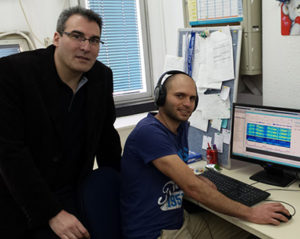
BGU Researchers Develop At-Home Sleep Apnea Test
BGU Researchers Develop At-Home Sleep Apnea Test
June 17, 2015
Elsevier — A science writer, David Levine, who suffers from a mild form of sleep apnea, recently visited BGU’s Marcus Family Campus and had the opportunity to meet with the sleep experts behind the development of an at-home device for diagnosing this sleep disorder.
An estimated 800 million people worldwide have poor sleep quality, including obstructive sleep apnea, snoring and insomnia, says Prof. Yaniv Zigel, head of the Biomedical Signal Processing Research Lab in BGU’s Department of Biomedical Engineering.
“It’s a huge public health issue compounded by the problem that 80 percent of people are unaware they have a problem,” says Prof. Zigel.
Prof. Zigel and his team have developed a new approach to measure sleep duration and detect sleep disorders that is a cheaper and an easier alternative to polysomnography (PSG), which is the gold standard for diagnosing sleep apnea and dates back to the 1950s.
Their new test uses a small device with a microphone, similar to a digital recorder, to measure breath sound analysis (BSA) and record a patient’s breathing. It does not require the use of electrodes or sensors, and lab personnel do not have to be present.
“The research at BGU was especially interesting to me because it makes the process of getting tested much easier; patients can do the test at home instead of sleeping overnight in a sleep clinic,” says Levine.
Read more of David Levine’s article on the Elsevier website >>




